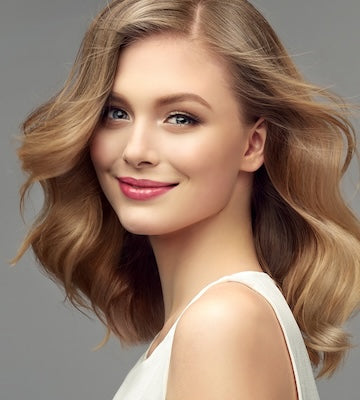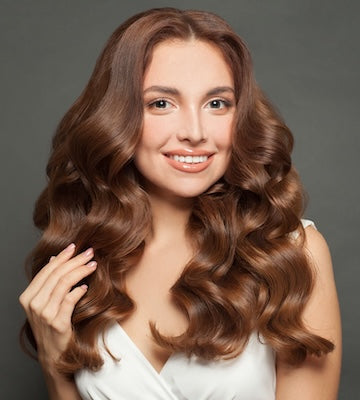Polycystic Ovary Syndrome (PCOS) is a hormonal condition that affects your body in many ways - including your hair. One of the more common (and frustrating) symptoms is hair thinning or loss. But there are ways to support your hair’s health and growth.
If you’re living with PCOS and noticing changes in your hair, you’re absolutely not alone. For many women, PCOS is a challenging condition to navigate, and when your hair starts to feel different, thinner or harder to manage, it can feel like yet another thing added to an already full plate.
But here’s the reassuring part. If PCOS is affecting your hair, there are so many things you can do to nourish it, from the inside out and outside in. In this article, we’ll help you understand what’s happening (explaining the science behind PCOS hair loss), and importantly, what you can do.
We’ll explore the causes of PCOS hair thinning, how PCOS hair loss treatment works, and positive steps you can take toward PCOS hair regrowth.
What can PCOS do to your hair?
Polycystic Ovary Syndrome (PCOS) is a hormonal condition that affects around 1 in 10 women in the UK. It involves a complex imbalance of hormones, particularly elevated androgens (like testosterone), insulin resistance and sometimes low levels of progesterone. These hormonal shifts can trigger changes in the body - including with your hair.
When it comes to hair, PCOS tends to have two major effects:
-
It can cause hair to grow more – but in places you might not want it, like the face, chest or lower back. This is called hirsutism
- It can cause scalp hair to thin or fall out – particularly at the crown or along your parting
This is because the hair follicles on different parts of your body react differently to androgens. Some are stimulated by higher testosterone levels (like those on the chin or chest), while others are sensitive to it in a way that causes them to shrink and weaken (like those on the scalp).
So yes, it’s completely possible (and a common symptom) to experience unwanted hair growth and scalp hair loss at the same time. It’s an emotional as well as physical experience that can have a big impact on confidence and self-esteem.
We’ll unpack the reasons behind these changes in more detail, before looking at things you can do to help.
Can PCOS cause hair loss?
Unfortunately, yes. Hair loss in women with PCOS is a common but distressing symptom. It often takes the form of androgenic alopecia, also known as female pattern hair loss. This is a gradual process, where the hair around the crown or top of the head becomes thinner over time.
What’s happening here is something called "miniaturisation." When testosterone is converted into dihydrotestosterone (DHT) in the body, that DHT binds to hair follicles in the scalp. Over time, these follicles shrink, causing the hairs to become finer, shorter and less pigmented. Eventually, the follicles may stop producing hair altogether.
This doesn’t happen overnight. And crucially, it doesn’t happen to everyone with PCOS. Some women may have high androgen levels and never experience any hair loss. Others may be more genetically sensitive to DHT and see noticeable thinning even if their hormone levels aren’t dramatically high.
What does PCOS hair loss look like?
This varies from woman to woman, but there are some telltale signs:
- Thinning around the crown or parting
- A widening of the parting over time
- A general lack of volume on top, even if the sides and back seem unaffected
- Increased hair shedding in the shower or on your pillow
- A ponytail that feels skinnier than it used to
Importantly, PCOS-related hair loss tends to be gradual and diffuse, rather than sudden bald patches. If you're unsure whether what you're experiencing is PCOS-related, it’s always worth speaking to your GP who can help confirm the cause.

Does PCOS affect hair quality?
As we’ve seen, yes. PCOS can affect hair quality, and often in subtle ways that add up over time.
Hair that once felt thick and strong might start to feel finer or more fragile. You might find it harder to grow your hair as long as it used to be, or the ends become dry and split quickly, even with regular trims. Oily roots and dry ends are also common with PCOS, thanks to an imbalance in scalp sebum production.
This all ties back to how PCOS disrupts the hair growth cycle. Healthy hair grows in a cycle: the growth phase (anagen), the transitional phase (catagen), and the resting/shedding phase (telogen). PCOS can shorten the growth phase and push more hairs prematurely into the shedding phase.
The result? Hair that feels like it isn’t thriving. The disruption of this cycle is one of the reasons PCOS hair growth can feel inconsistent, with some areas thinning while others grow excessively.
So, will PCOS cause hair loss? Not necessarily. But if you are experiencing hair thinning due to PCOS, understanding the cause is the first step in managing it.
How do I keep my hair healthy with PCOS?
In good news, there’s so much you can do to support your hair - and give yourself the best possible chance of slowing or reversing PCOS-related hair loss.
Here are some practical tips, rooted in science but easy to follow.
How to stop PCOS hair loss
-
Focus on scalp health: A healthy scalp means healthy hair. So when you’re buying shampoos and conditioners, look for products with gentle, nourishing ingredients. Tea tree, argan and olive oil can all keep the scalp balanced
-
Style with care: Avoid tight hairstyles (like high ponytails or tight braids) or heat tools where possible. Opt for satin scrunchies, microfibre towels and air-drying methods to reduce damage
-
Eat for hair health: Prioritise protein (for keratin production), iron, zinc and omega-3 fatty acids. Foods like salmon, eggs, leafy greens, lentils and nuts are all brilliant for PCOS hair growth
-
Consider supplements: If getting the right vitamins via your diet feels unmanageable, speak to your doctor about biotin, inositol, vitamin D and zinc. Inositol, in particular, may help with insulin sensitivity in PCOS, regulating androgens and supporting PCOS hair regrowth
-
Balance your blood sugar: PCOS is often linked to insulin resistance. Eating balanced meals with protein, fibre and healthy fats can help regulate blood sugar and reduce androgen spikes
-
Sleep and stress: Not always easy, we know. But stress can raise cortisol, which in turn can throw hormones further out of balance. Meditation, therapy or simply getting more sleep can all help
-
Don’t overwash: Stripping the scalp of natural oils can make it overproduce sebum. So counterintuitively, washing too much can actually make your hair greasier. Try washing 2-3 times a week, and use a clarifying shampoo once a fortnight to remove product build-up
-
Topical treatments: Minoxidil (sold under brand names like “Regaine”) is a common treatment for female pattern hair loss. There are also natural options like rosemary oil and caffeine serums. Results vary, but many women find them helpful
- Professional support: Consider speaking to a trichologist or dermatologist if you’re struggling. They can offer personalised advice based on your scalp and hormone profile and recommend the best PCOS hair loss treatment options for you
Should I wash my hair every day if I have PCOS?
This is a question that comes up a lot, so it’s worthwhile tackling explicitly.
The short answer? Don’t wash your hair every day if you can help it. Washing daily can sometimes aggravate the scalp and dry out the lengths. So if you’re dealing with PCOS hair loss or thinning, it’s a good idea to space out washes every two or three days instead.
If your hair is starting to feel a little greasy, try incorporating things like gentle scalp massages to distribute oil more evenly. This has the additional benefit of promoting hair health and thickness (as well as relaxation). A win, win.
Does PCOS hair get worse with age?
Sadly, for many women, the answer is yes. As we get older, oestrogen levels decline, particularly after our late-30s and into menopause. Oestrogen has a protective effect on hair follicles, helping keep them in the growth phase. When levels drop, androgens can take more of a front seat, amplifying their effects.
That means PCOS symptoms like hair thinning or hirsutism may become more noticeable with age - even if you didn’t experience them earlier in life. For some, this may feel like hair thinning due to PCOS is more pronounced year by year.
That’s why looking after your hair health early on is vital. Think of it like building a foundation: the more you can nourish and protect your follicles now, the better chance you have of keeping your hair strong and full in the years to come.
Can hair loss due to PCOS be reversed?
So, can hair grow back from PCOS? To end on a positive and hopeful note, absolutely - yes.
In many cases, PCOS-related hair loss can be reversed, or at least significantly improved. The earlier you catch it, the better your chances of stimulating regrowth. But even if you’ve been dealing with thinning hair for years, there are still options.
Hair follicles don’t die overnight. Even miniaturised ones can be reawakened with the right support. This might involve a combination of hair regrowth therapies such as hormonal treatment, topical treatments (like Minoxidil), nutritional support and lifestyle changes to tackle the hormonal imbalance at its root.
There’s no one-size-fits-all PCOS hair loss cure, but there are powerful tools that can help. And with consistency, patience and support, you can see real progress.
While you’re working on regrowth, all-over hair extensions or individual volume-boosting pieces (for instance, focusing on the crown or temples) can bridge the gap. At Phoenix Crown, we understand just how personal this journey can be. That’s why we offer luxury pure Virgin hair extensions that feel natural, blend beautifully and provide extra confidence when you need it most.
For personalised support with hair extensions, our expert team at Phoenix Crown will help you find the perfect fit for your hair, lifestyle and needs. Explore our full range and view our FAQs - or get in touch with any questions. Whether you want a discreet volume boost or full coverage, we’re here to guide you every step of the way.










